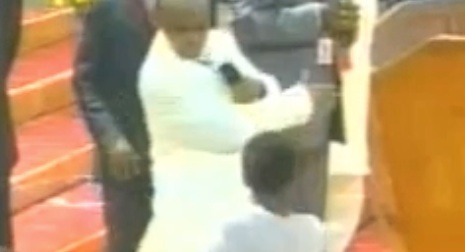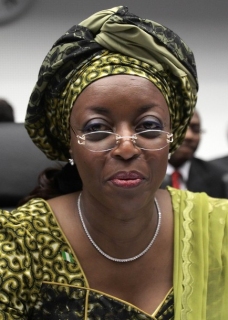The cleric in charge of St. Theresa’s Catholic Church, Madalla, the Very Rev. Isaac Achi, yesterday confirmed the death of 43 parishioners and unidentified persons in the Christmas Day explosions at the church.
He also said 73 others are receiving treatment in 12 hospitals in Abuja, Madalla, Suleja, Zuba, Kwamba and Kubwa.
Rev. Achi, at a briefing in Madalla by the Catholic Bishop of Minna Diocese, the Most Rev. Martin Igwe Uzoukwu, said the census of victims continues.
Rev. Achi said: “Up till yesterday when I found it uncomfortable, I moved into a community and I was able to identify 20 parishioners that died in the explosions. This morning (yesterday), they brought in a list of 23 others confirmed to have died in the blast.
“Until you (the parishioners) provide information, we will not know all those who were affected. In spite of the list we have, we will still go out to take stock.”
According to the list released by the church, 27 parishioners and others died; 73 are in hospitals.
Of the 27, five are unidentified.
The dead are: Anthony Okoronkwo; Comrade Dike A. Williams, Emmanuel Dike, Richard Dike, Lilian Dike, Lynda Chioma Ubiukwu, Uche Queen Obiukwu, Chidinma Cynthia Obiukwu, Linderlin Ifeoma Obiukwu, Ann-Chinedu Aigbadon, Chiemeri Nwachukwu, Cecilia Ebeku; Oluebube Faustina Pius, Chidera Sylvia Pius, Florence Nwachukwu and Eucharia Ewoh.
Others are: Joseph Daniel, Inspector Titus Eze, Obasi Jonathan Onyebuchi, Ehiawaguan Peter, Uche Esiri, Sgt. Kadiri Danjuma and five unidentified Persons.
Rev. Uzoukwu noted that the death toll is more than 40.
He said: “Reflecting on the ugly and unfortunate but avoidable incident in Madalla, I stare at the fact that we have lost more than 40 people with many others wounded, maybe maimed forever. They are in different hospitals in Suleja, Abuja Main Town and Gwagwalada.
“I look at the destruction of St. Theresa’s Church edifice, which cost us millions of Naira and the surrounding buildings that cost their owners a lot of money and efforts to build. What a loss, a big loss indeed to all of us, irrespective of tribal, religious, economic or cultural affiliations. What wrong have we done to merit this treatment?
“We join all people of goodwill to strongly condemn the ugly and barbaric act which was targeted at innocent and peaceful Nigerians. I call this an act of terrorism levelled against my people who went to church to celebrate the Holy Day of Christmas, a day that Christians all over the world commemorate the coming of our Lord Jesus Christ, the Divine Mercy Incarnate, the Prince of Peace and Love(Is 9:6, Jn 1: 14).”
The Bishop pleaded with Moslems to address the challenge posed by Boko Haram to the nation’s security.
He added: “I call on all my peace-loving Muslim friends to condemn publicly this act against us. I call on all our religious leaders, traditional rulers and custodians of the land in Niger State to stand up strongly against this Boko Haram group, who have claimed responsibility for this dastardly act against the good people of Niger State.
“Together, we will root out the evil that is coming among us. We all must put our hands on deck to take more proactive measures for the good of our people and our nation.
“We need to restrain our people from acts of violence against other groups in our communities. According to the words of the Sultan of Sokoto, this is not a fight between Islam and Christianity, but a fight between good and evil.”
He pleaded with the Federal Government to be more pro-active in preventing crimes.
He said: “I direct my plea to the Federal Government to listen to the cries of Nigerians. Let them realise that it is the blood of innocent citizens that is shed on a daily basis.
“It is a known fact that the security agencies in Nigeria are trying their best. But their best is only determined by their training, equipment and modes of operation. These have been proved to be ineffectual in preventing violent crimes in the country.
“They need to be more proactive in preventing crimes before they are committed rather than their belated reactions to criminal activities. Effective crime management falls under three stages: prevention, detection and prosecution.
“Offenders should be arrested, prosecuted and punished - if proved guilty. That will go a long way to reducing the escalating wave of criminal activities in our country.
“Prevention is always better than cure, hence it is better to detect and forestall a crime from being committed. We request our governments at all levels to go the extra mile to fish out criminals at all levels, bring them to book and prosecute them.”
Responding to a question, the Bishop said: “We need to go beyond words and move into action to ensure that our people live together in harmony and peace.
“My hope is that the Federal and State governments will take care of the medical treatment of those injured either here in Nigeria or abroad. I hope that they will help to compensate those who lost their relatives and their property during the ugly incident.”
On the burial of the victims of the blast, he said: “It is not going to be a mass burial. We are going to bury our people after due consultations. I cannot tell you the date right here, but you will hear from us.
“You cannot just go and bury people like that. They have families; we need to find out where the families are; we need to contact them on the burial programme.”
The Bishop urged the parishioners not to be afraid to come to church to worship God, in spite of the explosions.
He, however, announced a modification of church service in the Kwamba Dinary (including St. Theresa’s Church) for the New Year’s Eve.
The Bishop said: “If you run away from God, where will you run to? Come back, come back.”
“We have cancelled the midnight Mass for the New Year for all the churches in the Kwamba Dinary .Our tradition has always been to sleep overnight in the church for the New Year.
“But for the eve of the coming New Year, there is no sleeping in the church until January 1, 2012 in Kwamba Dinary. On December 31, you should come to the church at 4pm for service and by 6pm, it will be over. The church should make sure you talk to the appropriate authority so that they can bring back the curfew.
“But in the morning of Sunday, January 1, 2012, you should come back for normal service.”
Amid emotion from parishioners who were at the briefing, the Bishop asked them “not to seek vengeance”. “Let us forgive them and pray for peace and unity in this country,” he said, adding:
“Let us spend one hour daily to pray for unity and peace in this country. Use the first 15 minutes to read the Bible, the second 15 minutes to use Rosary, the third for meditation and the fourth for Divine mercy and prayers.
“And if you are a Muslim, spend one hour also daily. The first 15 minutes to read Quran and Hadith, the second for Takbir, the third to reflect and the fourth Divine mercy from Allah.”
Asked to reconcile the conflicting death toll figures, the Bishop said: “I went to the hospitals; I did not count them. My people have been killed and you are still worrying me. If you go to the mortuaries, you will see. I cannot count.”
On what the Catholic Mission is doing about security in churches, the Bishop said: “God is our security; unless God builds, the builder builds in vain. God is our safety; God is our security.”
Culled from The Nation Newspaper











